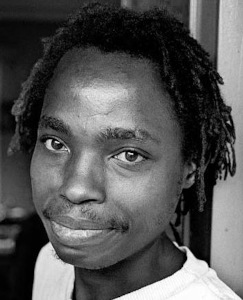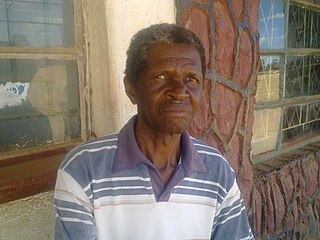Postcolonial literature is the literature by people from formerly colonized countries, originating from all continents except Antarctica. Postcolonial literature often addresses the problems and consequences of the decolonization of a country, especially questions relating to the political and cultural independence of formerly subjugated people, and themes such as racialism and colonialism. A range of literary theory has evolved around the subject. It addresses the role of literature in perpetuating and challenging what postcolonial critic Edward Said refers to as cultural imperialism.

Chenjerai Hove, was a Zimbabwean poet, novelist and essayist who wrote in both English and Shona. "Modernist in their formal construction, but making extensive use of oral conventions, Hove's novels offer an intense examination of the psychic and social costs - to the rural population, especially, of the war of liberation in Zimbabwe." He died on 12 July 2015 while living in exile in Norway, with his death attributed to liver failure.

Ndabaningi Sithole was a Zimbabwean politician and statesman who was the founder of the Zimbabwe African National Union (ZANU), a militant, nationalist organisation that opposed the government of Rhodesia, in July 1963. He worked as a United Church of Christ in Zimbabwe (UCCZ) minister. He spent 10 years in prison after the government banned ZANU. A rift along tribal lines split ZANU in 1975, and he lost the 1980 elections to Robert Mugabe.

Dambudzo Marechera was a Zimbabwean novelist, short story writer, playwright and poet. His short career produced a book of stories, two novels, a book of plays, prose, and poetry, and a collection of poetry. His first book, a fiction collection entitled The House of Hunger (1978), won the Guardian Fiction Prize in 1979. Marechera was best known for his abrasive, heavily detailed and self-aware writing, which was considered a new frontier in African literature, and his unorthodox behaviour at the universities from which he was expelled despite excelling in his studies.

Tsitsi Dangarembga is a Zimbabwean novelist, playwright and filmmaker. Her debut novel, Nervous Conditions (1988), which was the first to be published in English by a Black woman from Zimbabwe, was named by the BBC in 2018 as one of the top 100 books that have shaped the world. She has won other literary honours, including the Commonwealth Writers' Prize and the PEN Pinter Prize. In 2020, her novel This Mournable Body was shortlisted for the Booker Prize. In 2022, Dangarembga was convicted in a Zimbabwe court of inciting public violence, by displaying, on a public road, a placard asking for reform.
Chirikure Chirikure, is a Zimbabwean poet, songwriter, and writer. He is a graduate of the University of Zimbabwe and an Honorary Fellow of University of Iowa, US. He worked with one of Zimbabwe's leading publishing houses as an editor/publisher for 17 years, until 2002. He now runs a literary agency and also works as a performance poet, cultural consultant and translator.

Brian Chikwava is a Zimbabwean writer and musician. His short story "Seventh Street Alchemy" was awarded the 2004 Caine Prize for African writing in English; Chikwava became the first Zimbabwean to do so. He has been a Charles Pick fellow at the University of East Anglia, and lives in London. He continues to write in England and put out an album titled Jacaranda Skits.
Published between 1954 and 1981 Two Tone was a quarterly of Rhodesian poetry magazine, which signified a radical break with the largely conservative Eurocentric academic traditions which until then had dominated Zimbabwean poetry. Publishing poetry by both black and white writers working, predominantly in English but also in Ndebele and Shona, it challenged divisions and created a new open field for expression in divergent poetic voices and styles.
Ignatius Tirivangani Mabasa is a Zimbabwean writer, storyteller, and musician, who writes mainly in Shona.

Morgan Mahanya is a Zimbabwean Shona-language writer of detective fiction and war fiction. He has published 13 books since 1976, including books in Shona and in English, both fiction and nonfiction. Mahanya is one of the pioneering writers of detective stories in the Shona language. His books Chidamwoyo, Zvinoyera and The Wound are about the Rhodesian Bush War.

Barbara Makhalisa, also known by her married name as Barbara Nkala, is a teacher, Zimbabwean writer, Ndebele translator, novelist, editor and publisher, one of the earliest female writers published in Zimbabwe. She is the author of several books written in Ndebele, as well as in English, of which some have been used as school textbooks. Barbara is married to Shadreck Nkala. They have three adult children and six grandchildren.
Valerie Tagwira is a Zimbabwean writer who is a specialist obstetrician-gynecologist by profession. Her debut novel The Uncertainty of Hope, published in 2006 by Weaver Press, won the 2008 National Arts Merit Awards (NAMA) Outstanding Fiction Book.
Irene Staunton is a Zimbabwean publisher, editor, researcher and writer, who has worked in literature and the arts since the 1970s, both in the UK and Zimbabwe. She is co-founder and publisher of Weaver Press in Harare, having previously co-founded Baobab Books. Staunton is the editor of several notable anthologies covering oral history, short stories, and poetry, including Mothers of the Revolution: War Experiences of Thirty Zimbabwean Women (1990), Children in our Midst: Voices of Farmworker's Children (2000), Writing Still: New Stories from Zimbabwe (2003), Women Writing Zimbabwe (2008), Writing Free (2011), and Writing Mystery & Mayhem (2015).
Weaver Press is a Zimbabwean independent publisher formed in 1998 in Harare. The press was co-founded by Irene Staunton, who has been credited with "quietly shaping post-independence Zimbabwean literature", with Murray McCartney, and the Press has published many notable African writers. Weaver's list focuses on books on political and social history, the environment, media issues, women's and children's rights, fiction and literary criticism.
David Sunsly Mungoshi was a Zimbabwean novelist, actor, poet and teacher.
Jesesi Mungoshi is a Zimbabwean actress. She made her debut appearance in 1989, in the film titled, African Journey.
Flora Veit-Wild is a German literary academic, Professor of African Literatures and Cultures at Humboldt University, Berlin. She has published on the Zimbabwean writer Dambudzo Marechera, and on the body and madness in African literature.
Julius Sekai Chingono (1946-2011) was a writer from Zimbabwe. He wrote poetry in Shona and English.
Zimbabwean literature is literature produced by authors from Zimbabwe or in the Zimbabwean Diaspora. The tradition of literature starts with a long oral tradition, was influenced heavily by western literature during colonial rule, and acts as a form of protest to the government.







